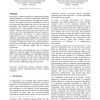Free Online Productivity Tools
i2Speak
i2Symbol
i2OCR
iTex2Img
iWeb2Print
iWeb2Shot
i2Type
iPdf2Split
iPdf2Merge
i2Bopomofo
i2Arabic
i2Style
i2Image
i2PDF
iLatex2Rtf
Sci2ools
106
click to vote
ACSC
2005
IEEE
2005
IEEE
Flexible Exclusion Control for Composite Objects
We present a simple approach for implementing flexible locking strategies in a system of components, which may themselves be composite objects. The approach is flexible in that a developer can defer the distribution of locks in the system until deployment: the choice of lock type and granularity may therefore depend on the operating environment. We only consider exclusion control; this includes mutexes, read-write locks and read-write sets, but does not cover state-dependent locking or transactionbased approaches. In general we express exclusion requirements as sets of conflict pairs on component have demonstrated the effectiveness of a general-purpose exclusion lock that can provide any required exclusion. We presume knowledge of the dependency between the interface of a composite object and its internal components. This work extends and simplifies the work on exclusion algebra for composite objects (Noble, Holmes and Potter the control required internally and that provided externall...
ACSC 2005 | Composite Objects | Computer Science | Flexible Locking Strategies | General-purpose Exclusion Lock |
| Added | 24 Jun 2010 |
| Updated | 24 Jun 2010 |
| Type | Conference |
| Year | 2005 |
| Where | ACSC |
| Authors | Abdelsalam Shanneb, John Potter |
Comments (0)

